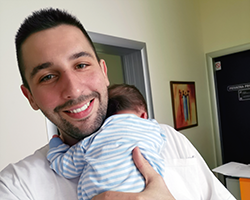Marko Obradovic: why new mothers need our support and why breastfeeding concerns us all

Marko Obradovic
“The most rewarding and the most challenging aspect of my work is gaining a woman’s trust by being the trusted friend she needs me to be and guiding her in becoming a mother,” explains Marko Obradovic, a paediatric nurse from Serbia working in a baby-friendly hospital, a United Nations-led initiative dating back to 1991.
“To establish a relationship with a woman and to have her accept you as an authority and a teacher is essential to support her in her new role as a mother. Competencies I rely on include being clear and answering any questions she might have, being patient and assertive, but also listening to a mother’s concerns,” says Marko, who has worked with mothers and newborns for nearly a decade.
“I strive to show empathy and express understanding and support to all women I care for, and in doing that my gender does not matter. I have never encountered anyone who felt uncomfortable just because I am a man advising on breastfeeding,” he says, while admitting that it is rare for a man to work as a paediatric nurse.
Newborn care must involve everyone, including fathers and grandparents
“I would like to see more awareness-raising activities for the general population. Breastfeeding should not just be a woman’s concern. It is important for fathers and grandparents to also be educated on how to best support mothers, and everyone should teach their own children to be supportive for when they grow up.
“My motivation for wanting to create a safer environment for women to give birth and care for their newborns also encompasses the role of fathers. That is why I am interested in learning about kangaroo care, a method of holding a baby that involves skin-to-skin contact, which would also benefit father–child bonding. I think it is important for fathers to be involved in parenting – nurturing and caring for your child should not threaten your masculinity.
“In my role as a paediatric nurse, I focus mostly on caring and breastfeeding. This includes techniques to prepare the environment for breastfeeding, night feeding tips, how to stimulate a baby, hold and wash a newborn, and how to understand their needs. I also hold seminars and workshops for pregnant mothers and their partners, and on my personal social media accounts I raise awareness about the importance of breastfeeding.
“Only 13% of infants are exclusively breastfed for the first 6 months of their lives in Serbia, while neighbouring countries reach over 90% rates. There is a distorted image that people have of preferring to see mothers feed their child with a bottle because breastfeeding is almost taboo, when in fact we know that breastfeeding is the best source of nourishment for newborns, as recommended by WHO.
“There is a misconception about women knowing how to be mothers automatically, when in fact it is a learning process. Giving birth can be very empowering, but it is also a time in which women may be vulnerable and susceptible to pressures from society. The pressure often comes from comparing herself to another mother and seeing differences and feeling like she failed, but pressure also comes from the surrounding environment and often the people around her and her partner.
“A factor that comes into play when addressing mothers’ concerns is the number of myths that are still pervasive in society. Misconceptions that are common include that a baby’s crying is dependent on whether a mother is calm or not, placing the burden on the woman and adding to her sense of guilt; other times, mothers are shamed for the way they breastfeed, their child’s sleeping patterns or weight, and so on. Instead, everyone should be supportive and encouraging.
“Assisting a woman who has placed her trust in me and seeing her blossom in her role as a mother is what I enjoy the most. That intimate and strong bond is very gratifying, because I essentially helped her master a life skill.
“There is a lot of work to be done in my society and I am eager to contribute to the change.”



